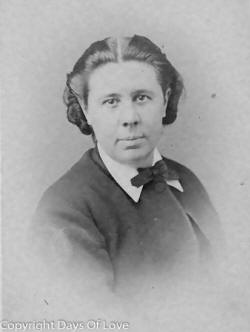

Queer Places:
82 Eccleston Square, Pimlico, London SW1V 1PH, UK
Victoria Press, 9 Coram St, Bloomsbury, London WC1N 1HE, UK
Victoria Press, Harp Alley, Farringdon St, London EC4A 4BL, UK
(1872) 50 Norfolk Square, Hyde Park, London W
(1895) 10 Plymouth Grove, Manchester M13, UK
112 Eaton Square, Belgravia, London SW1W, UK
Langham Place, 14-15 Langham Pl, Marylebone, London W1B 2QS, UK
15 Princess St, London SE1 6HH, UK
52 Bryanston Square, Marylebone, London W1H, UK
 Emily Faithfull (May
27, 1835 – May 31, 1895) was an
English
women's rights
activist, and publisher. She was a member of the
Society for Promoting the Employment of Women. She considered
compositor's work (a comparatively lucrative trade of the time) to be a
possible mode of employment for women to pursue. This upset the London
Printer's Union, which was male-dominated and claimed that women lacked the
intelligence and physical
skill to be
compositors.
Emily Faithfull (May
27, 1835 – May 31, 1895) was an
English
women's rights
activist, and publisher. She was a member of the
Society for Promoting the Employment of Women. She considered
compositor's work (a comparatively lucrative trade of the time) to be a
possible mode of employment for women to pursue. This upset the London
Printer's Union, which was male-dominated and claimed that women lacked the
intelligence and physical
skill to be
compositors.
Emily Faithfull was born on 27 May 1835 at Headley Rectory, Surrey. She was the youngest daughter of the Rev. Ferdinand Faithfull and Elizabeth Mary Harrison. Faithfull attended school in Kensington and was presented at court in 1857. [1]
Faithfull joined the Langham Place Circle, composed of fellow like-minded women Barbara Leigh Smith Bodichon, Bessie Rayner Parkes, Jessie Boucherett, Emily Davies, and Helen Blackburn. The Langham Place Circle advocated for legal reform in women's status (including suffrage), women's employment, and improved educational opportunities for girls and women. Although Faithfull identified with all three aspects of the group's aims, her primary areas of interest centered on advancing women's employment opportunities. The Circle was responsible for forming the Society for Promoting the Employment of Women in 1859. [1]
With the object of extending their sphere of labour, which was then very limited, in 1860 she set up in London a printing establishment for women, called The Victoria Press. From 1860 until 1866, Victoria Press published the feminist English Woman's Journal. Both Faithfull and her Victoria Press soon obtained a reputation for its excellent work, and Faithfull was shortly afterwards appointed printer and publisher in ordinary to Queen Victoria.[4]
In 1863 she began the publication of a monthly, Victoria Magazine, in which for eighteen years she continuously and earnestly advocated the claims of women to remunerative employment.
In 1864, Faithfull was implicated by involvement in a divorce case between Admiral Henry Codrington and his wife Helen Jane Smith Codrington. Codrington was accused of attempting to rape Faithfull, however as the case developed these charges were later dropped and Faithfull declined to provide testimony. It was also suggested that Faithfull and Helen were lesbian lovers. As a result of Faithfull's limited involvement and association with the case, her reputation suffered and she was shunned by the Langham Place Group. [1] It was after this association with the case that Faithfull moved to destroy all of her private papers, in particular letters written to and from her family, leaving little behind besides her professional publications and a few treasured letters and clippings. [2]
In January 1864 she published the first annual report of the Ladies' London Emancipation Society[6] and she went on to publish other works on behalf of this society.[7] In 1868 she published a novel, Change upon Change. She also appeared as a lecturer, and, with the object of furthering the interests of women, lectured widely and successfully both in England and the United States, which latter she visited in 1872 and 1882.
Of her nephews, one was the actor Rutland Barrington[3] and another the Indologist John Faithfull Fleet, ICS. Amongst her friends she counted Richard Peacock, one of the founders of the Beyer Peacock Locomotive Company, to whom she dedicated the Edinburgh edition of her book Three Visits To America with the words to my "Friend Richard Peacock Esq of Gorton Hall" in 1882. She was also the witness to the marriage of Peacock's daughter Jane Peacock to William Taylor Birchenough, the son of John Birchenough another manufacturer cited in Three Visits To America for his treatment of women employees in his silk mill in Macclesfield, at Brookfield Unitarian Church which Richard Peacock built in Gorton.
In 1888 she was awarded a civil list pension of £50. An 1894 article entitled “An Afternoon Tea with Miss Emily Faithfull” described her home in Manchester, decorated by “Miss Charlotte Robinson,” whom Faithfull readily disclosed “shares house with me.” Faithfull left all her property to Robinson in a will that called her “my beloved friend” whose “countless services” and “affectionate tenderness and care . . . made the last few years of my life the happiest I ever spent.”
She died in Manchester.[4]
She is the protagonist of Emma Donoghue's 2008 novel, The Sealed Letter, which concerns the Codrington divorce case of 1864.[5]
The archives of Emily Faithfull are held at The Women's Library at the Library of the London School of Economics, ref 7EFA
My published books: